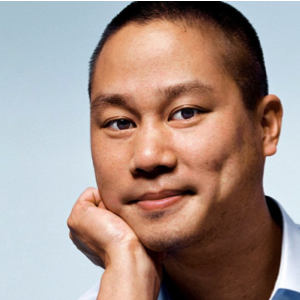Want to know what books Chris Anderson recommends on their reading list? We've researched interviews, social media posts, podcasts, and articles to build a comprehensive list of Chris Anderson's favorite book recommendations of all time.
1

Jacqueline Novogratz, author of the New York Times bestseller The Blue Sweater and founder and CEO of Acumen, shares an original short-list of essential leadership tools for the 21st century.
In 2001, when Jacqueline Novogratz founded Acumen, a global community of socially and environmentally responsible partners dedicated to changing the way the world tackles poverty, few had heard of impact investing—Acumen’s practice of “doing well by doing good.” Nineteen years later, there’s been a seismic shift in how corporate boards and other stakeholders evaluate... more Jacqueline Novogratz, author of the New York Times bestseller The Blue Sweater and founder and CEO of Acumen, shares an original short-list of essential leadership tools for the 21st century.
In 2001, when Jacqueline Novogratz founded Acumen, a global community of socially and environmentally responsible partners dedicated to changing the way the world tackles poverty, few had heard of impact investing—Acumen’s practice of “doing well by doing good.” Nineteen years later, there’s been a seismic shift in how corporate boards and other stakeholders evaluate businesses: impact investment is not only morally defensible but now also economically advantageous, even necessary. Still, it isn’t easy to reach a success that includes profits as well as mutually favorable relationships with workers and the communities in which they live. So how can today’s leaders, who often kick off their enterprises with high hopes and short timetables, navigate the challenges of poverty and war, of egos and impatience, which have stymied generations of investors who came before?
Drawing on inspiring stories from change-makers around the world and on memories of her own most difficult experiences, Jacqueline divulges the most common leadership mistakes and the mind-sets needed to rise above them. The culmination of thirty years of work developing sustainable solutions for the problems of the poor, So You Want to Change the World offers the perspectives necessary for all those—whether ascending the corporate ladder or bringing solar light to rural villages—who seek to leave this world better off than they found it. less See more recommendations for this book...
2

For David Deutsch, a young physicist of unusual originality, quantum theory contains our most fundamental knowledge of the physical world. Taken literally, it implies that there are many universes “parallel” to the one we see around us. This multiplicity of universes, according to Deutsch, turns out to be the key to achieving a new worldview, one which synthesizes the theories of evolution, computation, and knowledge with quantum physics. Considered jointly, these four strands of explanation reveal a unified fabric of reality that is both objective and comprehensible, the subject of this... more For David Deutsch, a young physicist of unusual originality, quantum theory contains our most fundamental knowledge of the physical world. Taken literally, it implies that there are many universes “parallel” to the one we see around us. This multiplicity of universes, according to Deutsch, turns out to be the key to achieving a new worldview, one which synthesizes the theories of evolution, computation, and knowledge with quantum physics. Considered jointly, these four strands of explanation reveal a unified fabric of reality that is both objective and comprehensible, the subject of this daring, challenging book. The Fabric of Reality explains and connects many topics at the leading edge of current research and thinking, such as quantum computers (which work by effectively collaborating with their counterparts in other universes), the physics of time travel, the comprehensibility of nature and the physical limits of virtual reality, the significance of human life, and the ultimate fate of the universe. Here, for scientist and layperson alike, for philosopher, science-fiction reader, biologist, and computer expert, is a startlingly complete and rational synthesis of disciplines, and a new, optimistic message about existence. less 
Chris AndersonI honestly think it was reading [this book] that finally gave me the courage, 18 years ago, to leave my company and take over leadership of TED. (Source)

Chris AndersonI honestly think it was reading [this book] that finally gave me the courage, 18 years ago, to leave my company and take over leadership of TED. (Source)

Chris AndersonI honestly think it was reading [this book] that finally gave me the courage, 18 years ago, to leave my company and take over leadership of TED. (Source)
See more recommendations for this book...
3

“For introverts who panic at the idea of networking, Wickre’s book is a deep, calming breath.” —Sophia Dembling, author of The Introvert’s Way
Former Google executive, editorial director of Twitter, self-described introvert, and “the best-connected Silicon Valley figure you’ve never heard of” (Walt Mossberg, Wall Street Journal), offers networking advice for anyone who has ever canceled a coffee date due to social anxiety. Learn to nurture a vibrant circle of reliable contacts without leaving your comfort zone.
Networking has garnered a... more “For introverts who panic at the idea of networking, Wickre’s book is a deep, calming breath.” —Sophia Dembling, author of The Introvert’s Way
Former Google executive, editorial director of Twitter, self-described introvert, and “the best-connected Silicon Valley figure you’ve never heard of” (Walt Mossberg, Wall Street Journal), offers networking advice for anyone who has ever canceled a coffee date due to social anxiety. Learn to nurture a vibrant circle of reliable contacts without leaving your comfort zone.
Networking has garnered a reputation as a sort of necessary evil. Some people relish the opportunity to boldly work the room, introduce themselves to strangers, and find common career ground—but for many others, the experience is awkward, or even terrifying.
The common networking advice for introverts are variations on the theme of overcoming or “fixing” their quiet tendencies. But Karen Wickre is a self-described introvert who has worked in Silicon Valley for thirty years. She shows you how to embrace your quiet nature and “make genuine connections that last, that we can nurture across the world for all kinds of purposes” (Chris Anderson, head of TED).
Karen’s “embrace your quiet side” approach is for anyone who finds themselves shying away from traditional networking activities, or for those who would rather be curled up with a good book on a Friday night than out at a party. With compelling arguments and creative strategies, this “practical, easy-to-use” (Sree Sreenivasan, former chief digital officer of Columbia University) book is a perfect guide. less 
Chip ConleyPragmatic and thoughtful, [the author] shows how networking can move from being transactional to being transformational in your life. (Source)

Chris AndersonSo many of us dislike or even fear the transactional nature of traditional networking. [The author] has done a great service by showing how it’s possible to make genuine connections that last, that we can nurture across the world for all kinds of purposes. (Source)

Chris AndersonSo many of us dislike or even fear the transactional nature of traditional networking. [The author] has done a great service by showing how it’s possible to make genuine connections that last, that we can nurture across the world for all kinds of purposes. (Source)
See more recommendations for this book...
4

From one of our leading technology thinkers and writers, a guide through the twelve technological imperatives that will shape the next thirty years and transform our lives
Much of what will happen in the next thirty years is inevitable, driven by technological trends that are already in motion. In this fascinating, provocative new book, Kevin Kelly provides an optimistic road map for the future, showing how the coming changes in our lives—from virtual reality in the home to an on-demand economy to artificial intelligence embedded in everything we manufacture—can be... more From one of our leading technology thinkers and writers, a guide through the twelve technological imperatives that will shape the next thirty years and transform our lives
Much of what will happen in the next thirty years is inevitable, driven by technological trends that are already in motion. In this fascinating, provocative new book, Kevin Kelly provides an optimistic road map for the future, showing how the coming changes in our lives—from virtual reality in the home to an on-demand economy to artificial intelligence embedded in everything we manufacture—can be understood as the result of a few long-term, accelerating forces. Kelly both describes these deep trends—flowing, screening, accessing, sharing, filtering, remixing, tracking, and questioning—and demonstrates how they overlap and are codependent on one another. These larger forces will completely revolutionize the way we buy, work, learn, and communicate with each other. By understanding and embracing them, says Kelly, it will be easier for us to remain on top of the coming wave of changes and to arrange our day-to-day relationships with technology in ways that bring forth maximum benefits. Kelly’s bright, hopeful book will be indispensable to anyone who seeks guidance on where their business, industry, or life is heading—what to invent, where to work, in what to invest, how to better reach customers, and what to begin to put into place—as this new world emerges. less 
David AllenKevin said: We’re at a time right now, an apex in our culture, that is more significant than the Industrial Revolution, in terms of how much it’s going to change the world. I love his first chapter. He said, ‘You’re never going to get really good at anything, because everything keeps being updated. (Source)

Chris AndersonThis boook offers profound insight into what happens (soon!) when intelligence flows as easily into objects as electricity. (Source)
See more recommendations for this book...
5

C. S. Lewis, Kenneth Branagh, et al | 4.46
Narnia...the land beyond the wardrobe door, a secret place frozen in eternal winter, a magical country waiting to be set free.
Lucy is the first to find the secret of the wardrobe in the professor's mysterious old house. At first her brothers and sister don't believe her when she tells of her visit to the land of Narnia. But soon Edmund, then Peter and Susan step through the wardrobe themselves. In Narnia they find a country buried under the evil enchantment of the White Witch. When they meet the Lion Aslan, they realize they've been called to a great adventure and bravely join the... more Narnia...the land beyond the wardrobe door, a secret place frozen in eternal winter, a magical country waiting to be set free.
Lucy is the first to find the secret of the wardrobe in the professor's mysterious old house. At first her brothers and sister don't believe her when she tells of her visit to the land of Narnia. But soon Edmund, then Peter and Susan step through the wardrobe themselves. In Narnia they find a country buried under the evil enchantment of the White Witch. When they meet the Lion Aslan, they realize they've been called to a great adventure and bravely join the battle to free Narnia from the Witch's sinister spell. less 
Lev GrossmanYou win some Turkish delight. Everyone knows Lewis’s Narnia books are a foundational work of the modern fantastic. But I don’t think Lewis gets enough credit for his craft as a writer. Those books are deceptively simple. Look at the way he constructed the opening of The Lion, the Witch and the Wardrobe. He puts the shadows of the war in the background, the excitement of a new house in the country... (Source)
See more recommendations for this book...
6

“The computer world is like an intellectual Wild West, in which you can shoot anyone you wish with your ideas, if you’re willing to risk the consequences.” —from Hackers & Painters: Big Ideas from the Computer Age, by Paul Graham
We are living in the computer age, in a world increasingly designed and engineered by computer programmers and software designers, by people who call themselves hackers. Who are these people, what motivates them, and why should you care?
Consider these facts: Everything around us is turning into computers. Your typewriter is... more “The computer world is like an intellectual Wild West, in which you can shoot anyone you wish with your ideas, if you’re willing to risk the consequences.” —from Hackers & Painters: Big Ideas from the Computer Age, by Paul Graham
We are living in the computer age, in a world increasingly designed and engineered by computer programmers and software designers, by people who call themselves hackers. Who are these people, what motivates them, and why should you care?
Consider these facts: Everything around us is turning into computers. Your typewriter is gone, replaced by a computer. Your phone has turned into a computer. So has your camera. Soon your TV will. Your car was not only designed on computers, but has more processing power in it than a room-sized mainframe did in 1970. Letters, encyclopedias, newspapers, and even your local store are being replaced by the Internet.
Hackers & Painters: Big Ideas from the Computer Age, by Paul Graham, explains this world and the motivations of the people who occupy it. In clear, thoughtful prose that draws on illuminating historical examples, Graham takes readers on an unflinching exploration into what he calls “an intellectual Wild West.”
The ideas discussed in this book will have a powerful and lasting impact on how we think, how we work, how we develop technology, and how we live. Topics include the importance of beauty in software design, how to make wealth, heresy and free speech, the programming language renaissance, the open-source movement, digital design, internet startups, and more. less 
Evan WilliamsI want everybody I know to read "How to Make Wealth" and "Mind the Gap" (chapters 6 and 7), which brilliantly articulate the most commonly, and frustratingly, misunderstood core economic principles of everyday life. (Source)

Yukihiro MatsumotoSince programmers create programs out of nothing, imagination is our only limitation. Thus, in the world of programming, the hero is the one who has great vision. Paul Graham is one of our contemporary heroes. He has the ability to embrace the vision, and to express it plainly. His works are my favorites, especially the ones describing language design. He explains secrets of programming,... (Source)

Chris AndersonA delightful ping-pong around the brain of a really smart guy. The chapter that answers the key question of our age-- why are nerds unpopular?-- is worth the price of admission alone. (Source)
See more recommendations for this book...
7

From the development of the U-2 to the Stealth fighter, the never-before-told story behind the high-stakes quest to dominate the skies Skunk Works is the true story of America's most secret & successful aerospace operation. As recounted by Ben Rich, the operation's brilliant boss for nearly two decades, the chronicle of Lockheed's legendary Skunk Works is a drama of cold war confrontations and Gulf War air combat, of extraordinary feats of engineering & achievement against fantastic odds. Here are up-close portraits of the maverick band of scientists & engineers who made the Skunk... more From the development of the U-2 to the Stealth fighter, the never-before-told story behind the high-stakes quest to dominate the skies Skunk Works is the true story of America's most secret & successful aerospace operation. As recounted by Ben Rich, the operation's brilliant boss for nearly two decades, the chronicle of Lockheed's legendary Skunk Works is a drama of cold war confrontations and Gulf War air combat, of extraordinary feats of engineering & achievement against fantastic odds. Here are up-close portraits of the maverick band of scientists & engineers who made the Skunk Works so renowned. Filled with telling personal anecdotes & high adventure, with narratives from the CIA & from Air Force pilots who flew the many classified, risky missions, this book is a portrait of the most spectacular aviation triumphs of the 20th century. less 
Chris Anderson@elidourado @pmarcas_likes What broke was our risk tolerance. The "Skunkworks" book is a great insider story of that. The day that the financial auditors outnumbered the engineers was the day the innovation died: https://t.co/ncrsulEZyC (Source)

Chris Anderson@elidourado @pmarcas_likes What broke was our risk tolerance. The "Skunkworks" book is a great insider story of that. The day that the financial auditors outnumbered the engineers was the day the innovation died: https://t.co/ncrsulEZyC (Source)

Chris Anderson@elidourado @pmarcas_likes What broke was our risk tolerance. The "Skunkworks" book is a great insider story of that. The day that the financial auditors outnumbered the engineers was the day the innovation died: https://t.co/ncrsulEZyC (Source)
See more recommendations for this book...
8

In Ted Talks Chris Anderson, head of TED, reveals the inside secrets of how to give a first-class presentation. Where books like Talk Like TED and TED Talks Storytelling whetted the appetite, here is the official TED guide to public speaking from the man who put TED talks on the world's stage. 'Nobody in the world better understands the art and science of public speaking than Chris Anderson. He is absolutely the best person to have written this book' Elizabeth Gilbert.
Anderson shares his five key techniques to presentation success: Connection,... more In Ted Talks Chris Anderson, head of TED, reveals the inside secrets of how to give a first-class presentation. Where books like Talk Like TED and TED Talks Storytelling whetted the appetite, here is the official TED guide to public speaking from the man who put TED talks on the world's stage. 'Nobody in the world better understands the art and science of public speaking than Chris Anderson. He is absolutely the best person to have written this book' Elizabeth Gilbert.
Anderson shares his five key techniques to presentation success: Connection, Narration, Explanation, Persuasion and Revelation (plus the three to avoid). He also answers the most frequently asked questions about giving a talk, from 'What should I wear?' to 'How do I handle my nerves?'.
Ted Talks is also full of presentation tips from such TED notable speakers as Sir Ken Robinson, Bill Gates, Mary Roach, Amy Cuddy, Elizabeth Gilbert, Dan Gilbert, Amanda Palmer, Matt Ridley and many more. This is a lively, fun read with great practical application from the man who knows what goes into a truly memorable speech. In Ted Talks Anderson pulls back the TED curtain for anyone who wants to learn how to prepare an exceptional presentation. less 
Chris AndersonIn Apollo week, a great book recommendation: this more than a story of a computer--it's about the first shot in the man vs machine battles (should astronauts be pilots or "spam in a can"?) that foreshadowed today's debates about drones & self driving cars
https://t.co/CidYughKHz (Source)

Chris AndersonIn Apollo week, a great book recommendation: this more than a story of a computer--it's about the first shot in the man vs machine battles (should astronauts be pilots or "spam in a can"?) that foreshadowed today's debates about drones & self driving cars
https://t.co/CidYughKHz (Source)

Chris AndersonIn Apollo week, a great book recommendation: this more than a story of a computer--it's about the first shot in the man vs machine battles (should astronauts be pilots or "spam in a can"?) that foreshadowed today's debates about drones & self driving cars
https://t.co/CidYughKHz (Source)
See more recommendations for this book...
9

With a foreword by Bill Gates
From Microsoft's President and one of the tech industry's wisest thinkers, a frank and thoughtful reckoning with how to balance enormous promise and existential risk as the digitization of everything accelerates.
Microsoft President Brad Smith operates by a simple core belief: when your technology changes the world, you bear a responsibility to help address the world you have helped create. This might seem uncontroversial, but it flies in the face of a tech sector long obsessed with rapid growth and sometimes on disruption as... more With a foreword by Bill Gates
From Microsoft's President and one of the tech industry's wisest thinkers, a frank and thoughtful reckoning with how to balance enormous promise and existential risk as the digitization of everything accelerates.
Microsoft President Brad Smith operates by a simple core belief: when your technology changes the world, you bear a responsibility to help address the world you have helped create. This might seem uncontroversial, but it flies in the face of a tech sector long obsessed with rapid growth and sometimes on disruption as an end in itself. Now, though, we have reached an inflection point: Silicon Valley has moved fast and it has broken things. A new understanding has emerged that companies that create technology must accept greater responsibility for the future. And governments will need to regulate technology by moving faster and catching up with the pace of innovation that is impacting our communities and changing the world.
In Tools and Weapons, Brad Smith takes us into the cockpit of one of the world's largest and most powerful tech companies as it finds itself in the middle of some of the thorniest emerging issues of our time. These are challenges that come with no preexisting playbook, including privacy, cybercrime and cyberwar, social media, the moral conundrums of AI, big tech's relationship to inequality and the challenges for democracy, far and near. While in no way a self-glorifying "Microsoft memoir," the book opens up the curtain remarkably wide onto some of the company's most crucial recent decision points, as it strives to protect the hopes technology offers against the very real threats it also presents. Every tool can be a weapon in the wrong person's hands, and companies are being challenged in entirely new ways to embrace the totality of their responsibilities. We have moved from a world in which Silicon Valley could take no prisoners to one in which tech companies and governments must work together to address the challenges and adapt to the changes technology has unleashed. There are huge ramifications to be thought through, and Brad Smith provides a marvelous and urgently necessary contribution to that effort. less 
Walter IsaacsonThis is a colorful and insightful insiders’ view of how technology is both empowering us and threatening us. From privacy to cyberattacks, this timely book is a useful guide for how to navigate the digital future. (Source)

Reid HoffmanIn the new book "Tools and Weapons," Microsoft president @BradSmi and @CarolAnnBrowne bring some of tech's current key issues to life through interesting stories from inside Microsoft and from history. An important and enjoyable read:
https://t.co/KW4Dj12dgw (Source)

Bill GatesA clear, compelling guide to some of the most pressing debates in technology today. (Source)
See more recommendations for this book...
10

Dr. Kai-Fu Lee—one of the world’s most respected experts on AI and China—reveals that China has suddenly caught up to the US at an astonishingly rapid and unexpected pace. In AI Superpowers, Kai-fu Lee argues powerfully that because of these unprecedented developments in AI, dramatic changes will be happening much sooner than many of us expected. Indeed, as the US-Sino AI competition begins to heat up, Lee urges the US and China to both accept and to embrace the great responsibilities that come with significant technological power. Most experts already say that AI will have a devastating... more Dr. Kai-Fu Lee—one of the world’s most respected experts on AI and China—reveals that China has suddenly caught up to the US at an astonishingly rapid and unexpected pace. In AI Superpowers, Kai-fu Lee argues powerfully that because of these unprecedented developments in AI, dramatic changes will be happening much sooner than many of us expected. Indeed, as the US-Sino AI competition begins to heat up, Lee urges the US and China to both accept and to embrace the great responsibilities that come with significant technological power. Most experts already say that AI will have a devastating impact on blue-collar jobs. But Lee predicts that Chinese and American AI will have a strong impact on white-collar jobs as well. Is universal basic income the solution? In Lee’s opinion, probably not. But he provides a clear description of which jobs will be affected and how soon, which jobs can be enhanced with AI, and most importantly, how we can provide solutions to some of the most profound changes in human history that are coming soon. less 
Yuval Noah HarariA superb and very timely survey of the impact of AI on the geopolitical system, the job market and human society. (Source)

Arianna HuffingtonKai-Fu Lee's experience as an AI pioneer, top investor, and cancer survivor has led to this brilliant book about global technology. AI Superpowers gives us a guide to a future that celebrates all the benefits that AI will bring, while cultivating what is unique about our humanity. It’s one of those books you read and think, ‘Why are people reading any other book right now when this is so clearly... (Source)

Satya NadellaKai-Fu Lee's smart analysis on human-AI coexistence is clear-eyed and a must-read. We must look deep within ourselves for the values and wisdom to guide AI's development. (Source)
See more recommendations for this book...
Don't have time to read Chris Anderson's favorite books? Read Shortform summaries.
Shortform summaries help you learn 10x faster by:
- Being comprehensive: you learn the most important points in the book
- Cutting out the fluff: you focus your time on what's important to know
- Interactive exercises: apply the book's ideas to your own life with our educators' guidance.
11

From the coauthor of the New York Times bestseller The Second Machine Age, a compelling argument—masterfully researched and brilliantly articulated—that we have at last learned how to increase human prosperity while treading more lightly on our planet.
Throughout history, the only way for humanity to grow was by degrading the Earth: chopping down forests, fouling the air and water, and endlessly digging out resources. Since the first Earth Day in 1970, the reigning argument has been that taking better care of the planet means radically changing course:... more From the coauthor of the New York Times bestseller The Second Machine Age, a compelling argument—masterfully researched and brilliantly articulated—that we have at last learned how to increase human prosperity while treading more lightly on our planet.
Throughout history, the only way for humanity to grow was by degrading the Earth: chopping down forests, fouling the air and water, and endlessly digging out resources. Since the first Earth Day in 1970, the reigning argument has been that taking better care of the planet means radically changing course: reducing our consumption, tightening our belts, learning to share and reuse, restraining growth. Is that argument correct?
Absolutely not. In More from Less, McAfee argues that to solve our ecological problems we don’t need to make radical changes. Instead, we need to do more of what we’re already doing: growing technologically sophisticated market-based economies around the world.
How can he possibly make this claim? Because of the evidence. America—a large, high-tech country that accounts for about 25% of the global economy—is now generally using less of most resources year after year, even as its economy and population continue to grow. What’s more, the US is polluting the air and water less, emitting fewer greenhouse gases, and replenishing endangered animal populations. And, as McAfee shows, America is not alone. Other countries are also transforming themselves in fundamental ways.
What has made this turnabout possible? One thing, primarily: the collaboration between technology and capitalism, although good governance and public awareness have also been critical. McAfee does warn of issues that haven’t been solved, like global warming, overfishing, and communities left behind as capitalism and tech progress race forward. But overall, More from Less is a revelatory, paradigm-shifting account of how we’ve stumbled into an unexpectedly better balance with nature—one that holds out the promise of more abundant and greener centuries ahead. less 
Chris AndersonSomething important happened around 1980 to break the energy dependence trend of the economy. Digitization = dematerialization
From @amcafee's fascinating new book
https://t.co/ZbK4txHksN https://t.co/HH9H4jddfX (Source)

Chris AndersonSomething important happened around 1980 to break the energy dependence trend of the economy. Digitization = dematerialization
From @amcafee's fascinating new book
https://t.co/ZbK4txHksN https://t.co/HH9H4jddfX (Source)

Chris AndersonSomething important happened around 1980 to break the energy dependence trend of the economy. Digitization = dematerialization
From @amcafee's fascinating new book
https://t.co/ZbK4txHksN https://t.co/HH9H4jddfX (Source)
See more recommendations for this book...
12

Jason Fried, David Heinemeier Hansson | 4.18
Most business books give you the same old advice: Write a business plan, study the competition, seek investors, yadda yadda. If you're looking for a book like that, put this one back on the shelf.
Rework shows you a better, faster, easier way to succeed in business. Read it and you'll know why plans are actually harmful, why you don't need outside investors, and why you're better off ignoring the competition. The truth is, you need less than you think. You don't need to be a workaholic. You don't need to staff up. You don't need to waste time on paperwork or meetings. You... more Most business books give you the same old advice: Write a business plan, study the competition, seek investors, yadda yadda. If you're looking for a book like that, put this one back on the shelf.
Rework shows you a better, faster, easier way to succeed in business. Read it and you'll know why plans are actually harmful, why you don't need outside investors, and why you're better off ignoring the competition. The truth is, you need less than you think. You don't need to be a workaholic. You don't need to staff up. You don't need to waste time on paperwork or meetings. You don't even need an office. Those are all just excuses.
What you really need to do is stop talking and start working. This book shows you the way. You'll learn how to be more productive, how to get exposure without breaking the bank, and tons more counterintuitive ideas that will inspire and provoke you.
With its straightforward language and easy-is-better approach, Rework is the perfect playbook for anyone who’s ever dreamed of doing it on their own. Hardcore entrepreneurs, small-business owners, people stuck in day jobs they hate, victims of "downsizing," and artists who don’t want to starve anymore will all find valuable guidance in these pages. less 
Jeff BezosUnperturbed by conventional wisdom, [the authors] start fresh and rewrite the rules of business. Their approach turns out to be as successful as it is counter-intuitive. (Source)

Mark CubanIf given a choice between investing in someone who has read Rework or has an MBA, I'm investing in Rework every time. This is a must read for every entrepreneur. (Source)

Tony HsiehThe wisdom in these pages is edgy yet simple, straightforward, and proven. Read this book multiple times to help give you the courage you need to get out there and make something great. (Source)
See more recommendations for this book...
13

Believe it or not, today we may be living in the most peaceful moment in our species' existence. In his gripping and controversial new work, New York Times bestselling author Steven Pinker shows that despite the ceaseless news about war, crime, and terrorism, violence has actually been in decline over long stretches of history. Exploding myths about humankind's inherent violence and the curse of modernity, this ambitious book continues Pinker's exploration of the essence of human nature, mixing psychology and history to provide a remarkable picture of an increasingly enlightened world. more Believe it or not, today we may be living in the most peaceful moment in our species' existence. In his gripping and controversial new work, New York Times bestselling author Steven Pinker shows that despite the ceaseless news about war, crime, and terrorism, violence has actually been in decline over long stretches of history. Exploding myths about humankind's inherent violence and the curse of modernity, this ambitious book continues Pinker's exploration of the essence of human nature, mixing psychology and history to provide a remarkable picture of an increasingly enlightened world. less 
Mark ZuckerbergMy second book of the year is The Better Angels of Our Nature by Steven Pinker. It's a timely book about how and why violence has steadily decreased throughout our history, and how we can continue this trend. Recent events might make it seem like violence and terrorism are more common than ever, so it's worth understanding that all violence -- even terrorism -- is actually decreasing over time.... (Source)

Eric SchmidtWhen you finish [this book], which takes a long time, you conclude that the world is in a much, much better place than it has been in the past. (Source)

Bill GatesYong succeeds in his intention to give us a 'grander view of life' and does so without falling prey to grand, unifying explanations that are far too simplistic. He presents our inner ecosystems in all their wondrous messiness and complexity. And he offers realistic optimism that our growing knowledge of the human microbiome will lead to great new opportunities for enhancing our health. (Source)
See more recommendations for this book...
14
The Beginning of Infinity: Explanations That Transform the World more The Beginning of Infinity: Explanations That Transform the World less 
Mark ZuckerbergReading has given me more perspective on a number of topics — from science to religion, from poverty to prosperity, from health to energy to social justice, from political philosophy to foreign policy, and from history to futuristic fiction.
This challenge has been intellectually fulfilling, and I come away with a greater sense of hope and optimism that our society can make greater progress in... (Source)

Chris AndersonA remarkable argument for the power of knowledge—as not just a human capability but as a force that shapes the universe. (Source)

Chris AndersonA remarkable argument for the power of knowledge—as not just a human capability but as a force that shapes the universe. (Source)
See more recommendations for this book...
Don't have time to read Chris Anderson's favorite books? Read Shortform summaries.
Shortform summaries help you learn 10x faster by:
- Being comprehensive: you learn the most important points in the book
- Cutting out the fluff: you focus your time on what's important to know
- Interactive exercises: apply the book's ideas to your own life with our educators' guidance.













